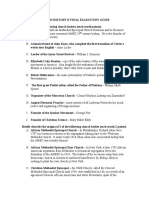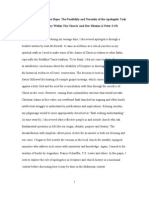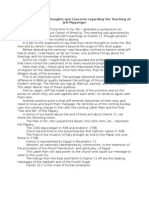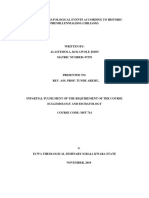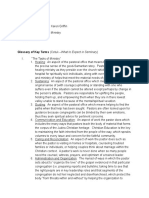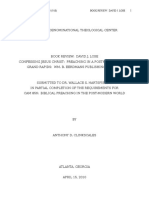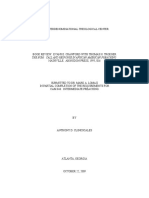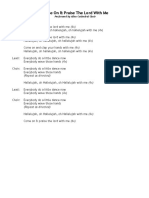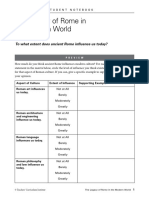Sermonic Meditation
Sermonic Meditation
Uploaded by
Anthony D. ClinkscalesCopyright:
Available Formats
Sermonic Meditation
Sermonic Meditation
Uploaded by
Anthony D. ClinkscalesOriginal Description:
Original Title
Copyright
Available Formats
Share this document
Did you find this document useful?
Is this content inappropriate?
Copyright:
Available Formats
Sermonic Meditation
Sermonic Meditation
Uploaded by
Anthony D. ClinkscalesCopyright:
Available Formats
Its time to grow up (Hebrews 5:11-14)
A D Clinkscales 1
Anthony Clinkscales
Dr. Wallace Hartsfield
ICAM845 Intro to Preaching
14 May 2009
Sermon Idea
I am meditating Hebrews 5:12-14
because I want to know why/how the first-century believers were not
maturing
in order to understand how 21st century believers
make the same mistake.
Sermon Foundation
Text:
Hebrews 5:11-14
Subject:
This sermon is about the believers duty to move beyond basic
teachings.
Proposition:
I propose that the believers duty to move beyond basic teachings
prepares him/her for the rigors of life, and obligates them to become agents
of empowerment in our communities.
Motivational Objective:
To move persons to consider the importance and benefits of growing to
a capacity to feast on a deeper knowledge of God.
Title:
Its time to grow up (Hebrews 5:11-14)
A D Clinkscales 2
Its time to grow up
Sermon Elements
Introduction:
Discuss the context of the text, informing hearers of the Sitz im Leben
(Setting in Life) of the first-century hearers. Discuss first-century
presuppositions that the author was addressing. Drive at the necessity of
growing up.
Body:
Expound what it means to grow up.
A. Inability to Teach and Pass on the Word of God
1. Spiritually stunted because of a chosen diet
2. Called, but not chosen
because of negligence
B. Preference for an Infant Diet
1. Wanting Gods banquet before spiritually capable to
digest it
2. The historical Jesus versus the authority
and power of Jesus sacrifice
C. Lack of Spiritual Sensitivity and Discernment
1. Can you recognize temptation before it traps
you?
2. Training consciences, senses,
minds, and bodies to distinguish good from evil
D. Obligations of Community
1. Nihilistic threat is thwarted by mature believers:
called, equipped and accountable
Conclusion:
Moving beyond basic teachings in Christianity prepares one for the
rigors of life, and empowers one to help others to grow spiritually.
Its time to grow up (Hebrews 5:11-14)
A D Clinkscales 3
Biblical Interpretation for Preaching
Text and Translation Issues
Text-critical concerns
The text is an aside located within an exhortation segment of the Hebrews
homily. This brief warning encompasses 5:11-14.
There are no major differences in translation among the biblical versions
consulted (KJV, NKJV, NIV, NASB, Amplified, NRSV, NJB, YLT). Only
observation of textual variants is the use of the word this in verse 11. The
NRSV notes that this word may be replaced with the word him.
Linguistic concerns
The pivotal words and their understanding in antiquity are as follows:
Dull (5:11) a combination of two Greek words meaning no and push.
The compound word means sluggish, slow, or numb. When
used of people, it usually indicates intellectual numbness or
thickness. (Dull of hearing)
Milk (5:12-13)
rudimentary teaching; pre-digested elementary teaching;
the elementary Christian understanding of the salvation
promised in the Scriptures
Solid food (5:12, 14)
more advanced teaching; the Lords ministry in
heaven as the pre-eminent high priest
Unskilled (5:13)
Inexperienced or not acquainted unable to put
information to effective use.
Distinguish good from evil (5:14)
the ability to discern what is morally
good or doctrinally correct from what is contrary to law
(divine or human) or truth. The idea is akin to the sense of
taste, by which a child grows through practice to
Its time to grow up (Hebrews 5:11-14)
A D Clinkscales 4
distinguish spinach from ice cream and good food from
spoiled.
The metaphors need to be explained. There is a need to provide examples
to clear any ambiguity or relate to contemporary setting. I can provide
examples of contemporary metaphors that convey similar meanings in our
context.
Historical Issues
Socio-Historical context
The author is unknown. He or she is adept in the Greek language and Jewish
tradition. The author is skilled in rhetoric.
The hearers/readers were first-century Jewish converts to Christianity. The
homily is a response to the apostatizing threat of the believers. It is an
exhortation to persevere and embrace the truth of Christs authority and the
power of Christs sacrifice. They were second-generation believers having
been baptized and instructed for a while, but had been stunted in their
growth. The author chastises them, but encourages them of the call to
ministry, and reminds them of the benefits of Christianity.
Literary-historical Issues
The text is the 3rd exhortation within the homily of the Letter to the Hebrews.
This exhortation interrupts the argument about Melchizedek until 7:1. Before
this passage, there is a driving theology of the high priesthood authority of
Christ and the purpose and power of the blood that Christ shed. Infused are
a couple of warnings, which is the style of this homily: Exposition
(Discourse/Application) followed by Exhortation (sequenced 4 times
throughout the homily)
The author uses familiar metaphors, milk and solid food (1 Cor 3:2; 1 Pet
2:2).
New Literary Issues
Narrative Issues
The authors tone shifts from critical to complimentary in this hortatory
passage. The community is encouraged to move forward, first toward
perfection (6:1), then to seize the hope set before us (6:18).
Its time to grow up (Hebrews 5:11-14)
A D Clinkscales 5
Post Modern Issues
Reader-Response issues
I interpret this text from the notion that the message, including the
metaphors, is applicable to the faith community. I presume that all believers
are ministers on one level or another. We are called to be witnesses. The
efficacy of our witness is predicated on our revelation and understanding of
who Jesus is and the implications of his ministry. I believe that to not heed
this warning even in modern times will be a disservice to all the people in our
community who need a witness to minister into their lives.
Commentary Consultation
Word Biblical Commentary:
The reason it was necessary to alert the readers to the importance of the
announced subject is that they have become nwqroi; tai`" ajkoai`", sluggish
in understanding or hard of hearing, cf. Preisker (TDNT 4:1126). The
choice of terms is significant in the context of v 9, where Jesus was
designated the source of eternal salvation for all who obey him (toi`"
uJpakouvousin). Deafness or dullness in receptivity is a dangerous condition
for those who have been called to radical obedience. The importance of
responsible listening has been stressed repeatedly in the sermon (2:1, we
must pay the closest attention to what we have heard [toi`" ajkousqei``sin];
cf. 3:7b8a, 15; 4:12, 7b). The charge of having become spiritually lethargic
in v 11 resumes the challenges expressed in the previous hortatory sections
and makes them more explicitly personal and relevant to the community (so
Peterson, RTR 35 [1976] 1516). What is implied is a lack of responsiveness
to the gospel and an unwillingness to probe the deeper implications of
Christian commitment and to respond with faith and obedience (cf. 2:14;
4:12). If this apathetic attitude was not checked, it would lead to spiritual
inertia and the erosion of faith and hope.
12 The key to the interpretation of vv 1214 is the recognition of the
presence of irony. The rebuke administered in v 12 may be related to a
tendency to withdraw from contact with outsiders and to the loss of certainty
which this presupposes. This proposal is supported by the contention that
they ought to be didavskaloi, teachers, which refers specifically to an
ability to communicate the faith to others (cf. Spicq, 2:143). The correlative
statement that you need someone to teach you again the elementary truths
of Gods revelation is normally taken to be the writers considered judgment
on the actual condition of the community. This understanding, however, is
difficult to reconcile with his determination to respond to them as to mature
Christians (cf. 6:1, 3). It is possible that the hearers themselves had
Its time to grow up (Hebrews 5:11-14)
A D Clinkscales 6
expressed to the writer, or to someone else, a need for rudimentary
instruction (cf. Nairne, The Epistle of Priesthood, 333; Peterson, RTR 35
[1976] 17). That would explain the slightly derogatory nuance in the
expression ta; stoicei`a, mere rudiments (where the notion of basic
principles is strengthened by th`" ajrch`", rendered elementary above; cf.
Delling, TDNT 7:687; NEB: the ABC of Gods oracles), as well as the touch of
sarcasm in the formulation of v 12a. The writers response in v 12b, then, is
ironical.
The source of the metaphors gavlakto", milk, and sterea`" trofh`", solid
food, was the assimilation of education to nurture in hellenistic popular
philosophy. In the ethical tradition the distinction between those at an
elementary stage of instruction and those who had attained an advanced
stage was commonly expressed in the comparison of infants who require a
diet of milk and adults who can enjoy solid food (for references to the Greek
ethical tradition, see Thsing, TTZ 76 [1967] 23334; for a review of the
relevant passages in Philo, Williamson, PhiloAbr, 28085; cf. 1 Cor 3:13). The
presence of this rhetorical convention in vv 12b14 has been characterized
as a pedagogical device with which the writer sought to convince the
community that they need to make greater progress in their understanding
of biblical theology or of the OT when interpreted in the light of the Christevent. Williamson, for example, asserts that the writer inherited an
understanding of education in terms of food and the various stages of human
development (Philo, 28586 [italics mine]; cf. 277308), and H. P. Owen
finds evidence in 5:116:3 for speaking of stages of ascent (NTS 3 [1956
57] 24353). Although this manner of characterization is appropriate to
Epictetus or Philo, it is inappropriate to Hebrews because there is no
reference in the text to an intermediate stage between infancy and
adulthood. In addressing the community the writer recognizes only an
either/or. The idea of progressive stages, or of development and growth
toward maturity, seems not to have been in his mind. This is not normal
pedagogics, because it acknowledges no alternative except regression to
infancy or adult acceptance of responsibility. With biting irony, the writer
calls the community to acknowledge its maturity, which has both ethical and
theological ramifications for responsible life in the world.
1314 The interpretation of v 13 is contingent upon a proper
understanding of the phrase a[peiro" lovgou dikaiosuvnh", inexperienced
(or, unacquainted) with the teaching about righteousness, or unskilled in
the word of righteousness. The expresssion lovgo" dikaiosuvnh", however, is
unusually difficult and has called forth a variety of proposals, listed below:
(1) The genitive case of dikaiosuvnh" is one of definition. The expression
signifies right speech and is to be interpreted in the light of the immediate
context, which refers to a nhvpio", an infant. One who is an infant is
incapable of speaking correctly (Riggenbach, 14445; Michel, 23637) or of
understanding the meaning of normal speech (Schrenk, TDNT 2:198; &BDF ;
165).
Its time to grow up (Hebrews 5:11-14)
A D Clinkscales 7
(2) The expression should be interpreted in a manner consonant with the
concentration of ethical vocabulary in 5:1114. The infant does not know
what is right (NEB); he lacks a moral standard or a principle of
righteousness. Consequently, he is unskilled in ethical reasoning (T. H.
Robinson, 67; Spicq, 2:144; Owen, NTS; 3 [195657] 244). He requires
instruction regarding the will of God (Delling, TDNT 8:77). A variation on
this proposal acknowledges that the formulation was drawn from the ethical
teachers, but what it refers to in Hebrews is correct theology. The person
described in v 13 is unskilled in making the basic distinctions in exegesis and
consequently was unprepared to engage in the discussion of the larger
problems of christology or Christian thought (Williamson, Philo, 28892, 299;
Peterson, RTR 35 [1976] 20).
(3) The formulation is synonymous with the figurative expression strong
food in vv 12 and 14. It has specific reference to the instruction presented in
7:110:18 and is roughly equivalent to the teaching of the Christian religion
(Gyllenberg, Zur Exegese, 77; Thsing, TTZ 76 [1967] 23940).
(4) The formulation connotes the teaching about righteousness that is
foundational to Christian faith, namely the insistence on Christ as our
righteousness (P. E. Hughes, 191).
All these proposals, we suggest, are not based on a firm linguistic
foundation. They draw their primary support from the immediate or more
distant context. It may be preferable, therefore, to take account of a
technical use of the formulation in the early second century that clearly links
the phrase with martyrdom. In calling for unceasing perseverance in
Christian hope, Polycarp appeals to Christ Jesus and says, he endured
everything. Therefore, let us become imitators of his patient endurance and
glorify him whenever we suffer for the sake of his name. I, therefore, exhort
you to obey the word of righteousness [peiqarcei`n tw`/ logw`/ th`"
dikaiosuvnh"] and practice patient endurance to the limitan endurance of
which you have had an object lesson not only in those blessed persons
Ignatius, Zosimus, and Rufus, but also in members of your own community
as well as in Paul himself and the other apostles (Phil. 8.19.1). J. A. Kleist
comments on the expression tw`/ logw`/ th`" dikaiosuvnh": Polycarp now
shows that the great and paramount lesson in holiness which a Christian has
received is to hold himself in readiness for martyrdom (ACW 1:193, n. 65
[italics mine]). Polycarps use of the motifs of endurance to the end and of
imitation in a context referring to known martyrs as those who had obeyed
the word of righteousness is suggestive for the interpretation of Hebrews
(cf. Heb 6:1112; 10:36; 13:7). If this is the proper linguistic context for
interpreting v 13, it suggests that what was involved in the regression of the
community was a failure in moral character rather than in keen theological
insight. The expression a[peiro" lovgou dikaiosuvnh" acknowledges a basic
moral weakness aggravated by the fear of violent death (cf. 2:1415). If the
community had begun to avoid contact with outsiders because they were
unprepared for martyrdom, a social setting is established for the rebuke of v
12, for the reference to the sharpening of ones faculties in the arena of
Its time to grow up (Hebrews 5:11-14)
A D Clinkscales 8
moral decision in v 14, and for the prospect of crucifying the Son of God
again and exposing him to public shame in 6:6.
In contrast to the child (v 13), the tevleioi, adults, are those who are
prepared for sterea; trofhv, solid food (v 14). In this context, solid food
must have reference to the actual instruction about the high priestly office of
Christ provided in 7:110:18, which makes explicit what was implied in the
foundational truths entrusted to the community (so Thsing, TTZ 76 [1967]
23941, 275; see Comment on 6:12). The emphasis in v 14, however, falls
on the further qualification of adults as those who have their spiritual
faculties trained by experience to distinguish good from evil. The Stoics had
used aijsqhthvrion as a technical term for an organ of sense; by metaphorical
extension it acquired an ethical sense (e.g., Jer 4:19 LXX). The plural form
speaks of a plurality of capacities for moral decision, which, through
continual use (e{xi"), have developed into specific qualities (cf. Delling,
TDNT 1:188; Williamson, Philo, 11416). The formulation of v 14b seems to
imply a capacity for spiritual discrimination and not simply moral
discernment (Michel, 237). The period of time contemplated in v 12 (dia; to;n
crovnon, by this time) has provided the community with the opportunity to
achieve a condition of moral and spiritual maturity that makes them capable
of sound discrimination. The play on words kalou` te kai; kakou`, good and
evil, evokes one strand of Jewish hope preserved in a Targumic comment on
Gen 3:22: Many people are to arise from the man, and from him will arise
one people who will be capable of distinguishing between good and evil (Tg.
Neof. and Tg. Ps.-J.. Gen 3:22).
In the contrast posed in vv 1314 it is significant that the writer alternates
between the singular (nhvpio", an infant) and the plural (teleivwn,
adults). It is v 14, with its description of a plurality of persons, that
describes the community prior to its recent withdrawal and regression. In vv
1114 the writer uses irony effectively to summon the house church to
resume their status as adults with its attendant responsibilities.1
Anthony D. Clinkscales
Hebrews 5:11-14
Lane, William L., Word Biblical Commentary, Volume 47a: Hebrews 1-8, (Dallas, Texas:
Word Books, Publisher) 1998.
Its time to grow up (Hebrews 5:11-14)
A D Clinkscales 9
About this we have much to say, or about him we have much to say that is
hard to explain, since you have become dull in understanding. These words
were uttered by an unknown writer of the first-century church. And what
makes up most of his or her homiletical discourse is a driving intent on
moving first-century hearers to an understandingan awareness,
acknowledgement, and understanding of Jesus priestly authority and the
power of his blood. The events of Calvary and the revelation of who Jesus is
are the driving points. Seemingly, this homily was dealing with the threat of
a mass exodus of Jewish converts to Christianity.Perhaps they were leaving
because of persecution.Perhaps they were among the victimized and
underprivileged status of society.perhaps there was social resentment and
hostility.perhaps they were collectively marginalized and stigmatized.and
perhaps it was all a result of Empire. You know hierarchical social
interactions and exploitative structures. The fact of the matter is that this
body of believers is at the brink of leaving the faith.
But this text does more than just encourage. There is a condescending,
chastising tone in this text. Commentators disagree about whether the
author is here rebuking those he or she is writing to for their failure to grow
spiritually, or whether he or she is simply using irony to shame the Jewish
believers about their slowness to learn. I think that in our setting, this text is
relative to our present context. Even among those who have been in the
faith for 30 years, there is a sad, troubling reality that the harvest is plentiful
but the laborers are few. And the few laborers who are laboring are
rendering stale, rehearsed, rehashed hear-say to eager listeners who are in
need of a rhema Word from the spirit of God. Im not just talking about in the
pulpits, but in our Christian witness, too many peoples breath reek of
similac when they should be regurgitating substance and life out of their
true, inner-most being.
Its time to grow up (Hebrews 5:11-14)
A D Clinkscales 10
For the writer says that though by this time you ought to be teachers, you
need someone to teach you (verse 12). Think about this, how would 30 yearold adult look if they have been living solely on a diet of milk? He or she
would be severely malnourished, and too weak to get around. Their bodily
growth would be stunted because of their diet. Likewise, we can be
spiritually stunted because of our chosen diet. People whom God has
called.from among all the believers being anxious to listen to teaching
about the prophets, angels, Moses, Aaron, and the law..and yet unable to
discern the teaching about Christ. I mean beyond the historical Jesus, but
having an understanding of the authority and power of Jesus sacrifice. And
realizing the authority we have been given because of Christ.
Their failure to perceive the supremacy of Christ was weakening their faith
and bringing them close to reverting back to their old ways. So we have to
put things back into perspective. We cant live on milk all of our lives
because we need to come to a point where we are able to digest solid food.
Settling for the infants diet will ultimately hinder us from feasting at Gods
banquet. Our capacity to feast on deeper knowledge of God is determined
by our spiritual growth. Too often we want Gods banquet before we are
spiritually capable of digesting it. As we grow in the Lord, we have to put
into practice what we learn then our capacity to understand will also grow.
Moving from the basic understanding of salvation into the more advanced
understanding of Jesus ministry prepares us for the rigors of life that we are
bound to face. Jesus ministry gives us power and authority. God raised us
up with Christ and seated us with him in the heavenly realms. For what are
humans that God is mindful of us.God has made us a little lower than the
angels. We were made to have dominion on the earth. Sin changed that for
a minute, but now we are back in our rightful positionand we have power
Its time to grow up (Hebrews 5:11-14)
A D Clinkscales 11
and authority. It all depends on what you are eating. Maturity in faith
depends on the same logic as all other growth. One must advance stage by
stage, and not be forever preoccupied with starting over. In the natural, as
well as in the spiritual, the key to proper nurture is appetite and the will to
advance.
In order to grow from infant Christians to mature Christians, we must learn
discernment. We must train our consciences, our senses, our minds, and our
bodies to distinguish good from evil. Can you recognize temptation before it
traps you? Can you tell the difference between a correct use of Scripture and
a mistaken one?
Once we become mature believers, then we can try to help somebody else.
With all of the hopelessness, meaninglessness, and lovelessness in our
communities, there is a need for mature believers. Somebody awaits your
witness. Somebody is in need of true ministry. The table is spread, and the
feast of the Lord is going on! Let us get away from ignorance and
emotionalism. Away with the superficial messages that entertain peoples
lust for fame and fortune away from the false presentations of a gospel
that is juxtaposed with capitalism, making us more business-minded than
kingdom mission-minded. We should embrace who we are in Christ. We are
ambassadors and instigators of change. So let us establish Gods peace in
the earth. Lets be accountable for our actions because were redeemed,
conveyors of the truth of God above and the God in us. Its time friends, its
time to grow up.
You might also like
- Sak YantDocument13 pagesSak Yantellvira1991100% (9)
- Love, Power and JusticeDocument1 pageLove, Power and JusticeAnthony D. ClinkscalesNo ratings yet
- The Burdensome Joy of Preaching by James Earl MasseyDocument3 pagesThe Burdensome Joy of Preaching by James Earl MasseyAnthony D. ClinkscalesNo ratings yet
- Come Thou Almighty KingDocument1 pageCome Thou Almighty KingAnthony D. Clinkscales100% (2)
- Ephesians 6 10-18 A Call To Personal Pie PDFDocument12 pagesEphesians 6 10-18 A Call To Personal Pie PDFdario langitNo ratings yet
- Review Hoehner, Harold W., Ephesians - An Exegetical CommentaryDocument3 pagesReview Hoehner, Harold W., Ephesians - An Exegetical Commentarygersand6852100% (1)
- Church History II Final Exam Study GuideDocument8 pagesChurch History II Final Exam Study GuideAnthony D. Clinkscales100% (2)
- And He Shall PurifyDocument1 pageAnd He Shall PurifyAnthony D. Clinkscales0% (1)
- Dechter v. City of Newton School Committee ComplaintDocument495 pagesDechter v. City of Newton School Committee ComplaintAmericans for Peace and ToleranceNo ratings yet
- Concepts and Aims of National Philosophy of EducationDocument13 pagesConcepts and Aims of National Philosophy of EducationKaliswary KathanNo ratings yet
- Commentary Search Based On Hebrews 6:1-8Document11 pagesCommentary Search Based On Hebrews 6:1-8Joel DormanNo ratings yet
- Grow Up or Get Out A Socio-Rhetorical AnDocument17 pagesGrow Up or Get Out A Socio-Rhetorical AnJokoNo ratings yet
- Gnostics - I Tim 2 15Document6 pagesGnostics - I Tim 2 15Más AlláNo ratings yet
- TonguesnprophecyDocument24 pagesTonguesnprophecyQuotesflyNo ratings yet
- Reason For Hope: Doing Apologetics in MalaysiaDocument21 pagesReason For Hope: Doing Apologetics in MalaysiaDaveNo ratings yet
- A King James Vocabulary LessonDocument10 pagesA King James Vocabulary LessonBobby Michaels100% (1)
- Wilderness ApostasyDocument13 pagesWilderness Apostasysinger_ujNo ratings yet
- Hermeneutics and The Theological Task - Walter C. Kaiser, JRDocument9 pagesHermeneutics and The Theological Task - Walter C. Kaiser, JRSaulo FelipeNo ratings yet
- Chapter II (Baldwin)Document9 pagesChapter II (Baldwin)Miguel Aguilar AguilarNo ratings yet
- Master's Seminary Journal 28-1 PDFDocument117 pagesMaster's Seminary Journal 28-1 PDFeduardoe1986108250% (2)
- RaptureDocument25 pagesRapturedemerinaljonNo ratings yet
- 3. Paul Missio.. 9 Spt. -NusaDocument8 pages3. Paul Missio.. 9 Spt. -NusaAlanthung ShitioNo ratings yet
- Coon Roger HermeneuticsDocument41 pagesCoon Roger HermeneuticsEdgar Guillermo BustamanteNo ratings yet
- The Whole Christ for the Whole World: A Wesleyan Perspective on the Work of ChristFrom EverandThe Whole Christ for the Whole World: A Wesleyan Perspective on the Work of ChristNo ratings yet
- Hebrews 6_4-6Document17 pagesHebrews 6_4-6JohnStevensonNo ratings yet
- Affiliated To Senate of SeramporeDocument6 pagesAffiliated To Senate of SeramporeJaison Kaduvakuzhiyil VargheseNo ratings yet
- Understanding Repentance - A Condition of Salvation, or Something MoreDocument17 pagesUnderstanding Repentance - A Condition of Salvation, or Something MoreStephanie Caramete100% (1)
- Dynamics of PreachingDocument8 pagesDynamics of PreachingMatthew ndohNo ratings yet
- Tongue Paper WritingDocument5 pagesTongue Paper Writingnewaboucha97No ratings yet
- Vladan PerisicDocument16 pagesVladan PerisicMihailo JovisevicNo ratings yet
- 1Cor 13 - Houghton (1)Document9 pages1Cor 13 - Houghton (1)jezreelmadsaNo ratings yet
- Final Exam Take-HomeDocument5 pagesFinal Exam Take-HomeEsal ShakilNo ratings yet
- To Be Continued by Samuel Waldron A ReviDocument9 pagesTo Be Continued by Samuel Waldron A RevifineNo ratings yet
- Walvoord John The Holy Spirit and Spiritual GiftsDocument15 pagesWalvoord John The Holy Spirit and Spiritual Giftsapi-242911311No ratings yet
- 29 2 08 Conversion Facets...Document12 pages29 2 08 Conversion Facets...RukuzoNo ratings yet
- Exegesis of Philip 2-12-18Document18 pagesExegesis of Philip 2-12-18Ruben CruzNo ratings yet
- Iron Sharpens Iron: A Discussion Guide for Twenty-First-Century SeekersFrom EverandIron Sharpens Iron: A Discussion Guide for Twenty-First-Century SeekersNo ratings yet
- Pointers For Revelation and Inspiration: 1. The Concept of RevelationDocument7 pagesPointers For Revelation and Inspiration: 1. The Concept of RevelationtheomarioNo ratings yet
- The Influence and Use of Daniel 11 and 12 in The Olivet Discourse Hugo LeonDocument35 pagesThe Influence and Use of Daniel 11 and 12 in The Olivet Discourse Hugo LeonJamesNo ratings yet
- Entire SanctificationDocument11 pagesEntire Sanctificationapi-272400335No ratings yet
- Pauls Logic of Resurrection in 1 Corinthians 15Document17 pagesPauls Logic of Resurrection in 1 Corinthians 15api-371347720No ratings yet
- The Apocalypse - The Wise Shall Understand, A Commentary On The RevelationDocument295 pagesThe Apocalypse - The Wise Shall Understand, A Commentary On The RevelationDesmond AllenNo ratings yet
- VAN GEMEREN+ +the+Sons+of+God+in+Gen+6.1 4 Evangelical+DemythologizationDocument30 pagesVAN GEMEREN+ +the+Sons+of+God+in+Gen+6.1 4 Evangelical+DemythologizationIvanovici Daniela100% (1)
- Southeastern Baptist Theological SeminaryDocument13 pagesSoutheastern Baptist Theological Seminaryboverman3042No ratings yet
- Life Woven into God: Sermons for the Lectionary, Year B, Pentecost through Christ the KingFrom EverandLife Woven into God: Sermons for the Lectionary, Year B, Pentecost through Christ the KingNo ratings yet
- Contextualization in The NTDocument3 pagesContextualization in The NTJoseph Koech100% (2)
- Summary of Grace and Agency in Paul and PDFDocument20 pagesSummary of Grace and Agency in Paul and PDFArtur SantosNo ratings yet
- Chasm EphremDocument105 pagesChasm EphremacapboscqNo ratings yet
- Relationship Is the Transformative Space: Living in the Not YetFrom EverandRelationship Is the Transformative Space: Living in the Not YetNo ratings yet
- Elvis Reflection Galatians 2Document5 pagesElvis Reflection Galatians 2Rev. Kwaku Okyere Danquah KODNo ratings yet
- R. T. France Conversion in The Bible : Has DoctrineDocument20 pagesR. T. France Conversion in The Bible : Has DoctrineServando AsuajeNo ratings yet
- Pippenger With Commentary by PrewittDocument32 pagesPippenger With Commentary by PrewittAlvin Cardona100% (2)
- Sola Sermo Towards A Theology of ProclamDocument23 pagesSola Sermo Towards A Theology of ProclamDaniel BoleaNo ratings yet
- A Distinct Twenty-First Century Pentecostal HermeneuticFrom EverandA Distinct Twenty-First Century Pentecostal HermeneuticNo ratings yet
- BIblical Theology (Lecture Notes) - Graeme GoldsworthyDocument45 pagesBIblical Theology (Lecture Notes) - Graeme Goldsworthygodzillafood100% (6)
- Faith-Learning IntegrationDocument95 pagesFaith-Learning IntegrationHendra Syah PutraNo ratings yet
- Buku Saku ContohDocument60 pagesBuku Saku ContohGrivin Wilson RumagitNo ratings yet
- The Apocalypse - The Wise Shall UnderstandDocument297 pagesThe Apocalypse - The Wise Shall UnderstandDesmond AllenNo ratings yet
- Purpose of The Parenthetical Portions of HebrewsDocument3 pagesPurpose of The Parenthetical Portions of HebrewsRafa_CrouchNo ratings yet
- Prosperity Teaching in An African Context: Peter YoungDocument16 pagesProsperity Teaching in An African Context: Peter YoungGirma TolesaNo ratings yet
- Importance of Five Solas in Philippine ChurchesDocument18 pagesImportance of Five Solas in Philippine ChurchesRoss PetalverNo ratings yet
- Dei Bible Verson (DBV)Document124 pagesDei Bible Verson (DBV)Dr Avitus LeonardNo ratings yet
- John EschatologyDocument18 pagesJohn EschatologyAlaiyemola KolawoleNo ratings yet
- Foundations For Ministry Glossary of TermsDocument13 pagesFoundations For Ministry Glossary of TermsAnthony D. Clinkscales100% (1)
- Ethics Lecture VDocument3 pagesEthics Lecture VAnthony D. ClinkscalesNo ratings yet
- Developing The SermonDocument3 pagesDeveloping The SermonAnthony D. Clinkscales100% (1)
- Dear Jesus, I Love YouDocument1 pageDear Jesus, I Love YouAnthony D. ClinkscalesNo ratings yet
- Confessing Jesus Christ: Preaching in A Postmodern World (David J. Lose)Document7 pagesConfessing Jesus Christ: Preaching in A Postmodern World (David J. Lose)Anthony D. ClinkscalesNo ratings yet
- The Hum: Call and Response in African American Preaching (Crawford/Troeger)Document2 pagesThe Hum: Call and Response in African American Preaching (Crawford/Troeger)Anthony D. ClinkscalesNo ratings yet
- Come On & Praise The Lord With MeDocument1 pageCome On & Praise The Lord With MeAnthony D. Clinkscales100% (1)
- Church IssuesDocument2 pagesChurch IssuesAnthony D. ClinkscalesNo ratings yet
- Other-Wise Preaching: A Postmodern Ethic For Homiletics (McClure)Document7 pagesOther-Wise Preaching: A Postmodern Ethic For Homiletics (McClure)Anthony D. ClinkscalesNo ratings yet
- Christian Education and Ministry PaperDocument4 pagesChristian Education and Ministry PaperAnthony D. ClinkscalesNo ratings yet
- Preaching The Psalms (McCann)Document6 pagesPreaching The Psalms (McCann)Anthony D. ClinkscalesNo ratings yet
- Byron Cage MedleyDocument1 pageByron Cage MedleyAnthony D. ClinkscalesNo ratings yet
- Appointed For DisappointmentDocument3 pagesAppointed For DisappointmentAnthony D. ClinkscalesNo ratings yet
- Celebrate: Performed by Sha' SimpsonDocument1 pageCelebrate: Performed by Sha' SimpsonAnthony D. ClinkscalesNo ratings yet
- By Faith: Performed by New Birth Total Praise ChoirDocument1 pageBy Faith: Performed by New Birth Total Praise ChoirAnthony D. ClinkscalesNo ratings yet
- ACR - Values Formatioon Grade 6Document4 pagesACR - Values Formatioon Grade 6Rhoda Tomelden100% (1)
- Journal of Ethnology and Folkloristics, Vol. 7, No. 1Document161 pagesJournal of Ethnology and Folkloristics, Vol. 7, No. 1Ergo_Hart_V_st_5475No ratings yet
- DatesheetSSC (A) Exam2014Document2 pagesDatesheetSSC (A) Exam2014Ajmal KhanNo ratings yet
- That's My KingDocument26 pagesThat's My KingDavid JosephNo ratings yet
- Hudson Litchfield News 4-17-2015Document16 pagesHudson Litchfield News 4-17-2015Area News GroupNo ratings yet
- Chanute First United Methodist Church - February 2013 NewsletterDocument8 pagesChanute First United Methodist Church - February 2013 NewsletterAndrew RobertsNo ratings yet
- Euthyphro Plato PDFDocument2 pagesEuthyphro Plato PDFCarlaNo ratings yet
- Christian Congregation of Jehovah's WitnessesDocument3 pagesChristian Congregation of Jehovah's WitnessesAlex NaupayNo ratings yet
- HO For CFE102 MIDTERMDocument4 pagesHO For CFE102 MIDTERMDeborah Kilongan CalpoNo ratings yet
- Astrology Numerology &: We All Share An Intimate RelationshipDocument2 pagesAstrology Numerology &: We All Share An Intimate Relationshipshubham_mondal9744No ratings yet
- Ancient Greek Web QuestDocument7 pagesAncient Greek Web Questfps_texazNo ratings yet
- Aw Isn 38 PDFDocument10 pagesAw Isn 38 PDFmariah felixNo ratings yet
- Teleological EthicsDocument2 pagesTeleological EthicsdanirachmaNo ratings yet
- Prospectus WhereChildrenSleepDocument18 pagesProspectus WhereChildrenSleepYorka OlavarriaNo ratings yet
- Sri Guru GitaDocument43 pagesSri Guru GitaDowlutrao Gangaram100% (1)
- Amahuacas and The Spirit World - Robert CarneiroDocument7 pagesAmahuacas and The Spirit World - Robert CarneiroCarmen Morales TorresNo ratings yet
- The Tablet of Maqsúd (Law - I-Maqsúd)Document8 pagesThe Tablet of Maqsúd (Law - I-Maqsúd)BVILLARNo ratings yet
- Compare and Contrast Aristotle PlatoDocument7 pagesCompare and Contrast Aristotle PlatoCharlotte'Lushy'LushNo ratings yet
- BOL On Settler CommunitiesDocument27 pagesBOL On Settler CommunitiesKevin LavinaNo ratings yet
- The Brothers KaramazovDocument1,313 pagesThe Brothers KaramazovTLuke MartinsNo ratings yet
- Make A Commitment To YourselfDocument5 pagesMake A Commitment To YourselfAnonymous i5SlfCJqYNo ratings yet
- SUJATA BHATT - A Different HistoryDocument2 pagesSUJATA BHATT - A Different Historyminecrafterpro23000% (1)
- Evangelist Sunday OgucheDocument5 pagesEvangelist Sunday OgucheEvangelist Sunday OgucheNo ratings yet
- SANABIL Education SystemDocument38 pagesSANABIL Education SystemTayyab HaneefNo ratings yet
- Walter Russell - The Message of The Divine Iliad 1Document105 pagesWalter Russell - The Message of The Divine Iliad 1PeteNo ratings yet
- The Path To Ummahood in NigeriaDocument76 pagesThe Path To Ummahood in NigeriaImran MuhammadNo ratings yet
- January 14, 2016 Courier SentinelDocument16 pagesJanuary 14, 2016 Courier SentinelcwmediaNo ratings yet






